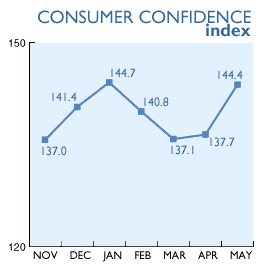
 | Printer Friendly Output |
| Confidence surges in May |
| U.S. consumer confidence index jumps to 144.4; second-highest level ever |
| By Staff Writer M. Corey Goldman May 30, 2000: 11:26 a.m. ET |
NEW YORK (CNNfn) - U.S. consumer confidence gathered steam for the first time in four months in May, rising to a near record despite higher interest rates and stock market volatility that were widely expected to deter consumers from prying open their wallets. The Conference Board reported Tuesday that its key gauge of consumer confidence jumped to 144.4 in May, up from a revised 137.7 in April. Analysts polled by Briefing.com had expected the index to rise to 137.0 for the month. The present situation index rose to 183.1 from 179.8 in April, while the outlook for conditions six months from now rose to 118.7 from 109.7. The Conference Board reported Tuesday that its key gauge of consumer confidence jumped to 144.4 in May, up from a revised 137.7 in April. Analysts polled by Briefing.com had expected the index to rise to 137.0 for the month. The present situation index rose to 183.1 from 179.8 in April, while the outlook for conditions six months from now rose to 118.7 from 109.7.The numbers came as a surprise to analysts and investors who had expected to see more signs that the Federal Reserve's recent spate of interest rate increases, along with seesawing activity in the stock market, was damping investors' confidence and subsequent desire to spend. Consumer spending accounts for more than two-thirds of economic output. "With unemployment at a 30-year low and the short-term Conference Board forecast projecting favorable labor market conditions, confidence is expected to remain strong through the summer," said Lynn Franco, director of the board's consumer research center. "Volatile financial markets and interest rate hikes are not expected to have a significant impact." What both Franco and other economists immediately pointed to was the tight U.S. labor market, which has created a shortage of skilled workers in almost every industry and prompted companies to start paying their workers more in salaries and benefits -- a situation that can trigger inflation.  Those conditions have made consumers feel confident about their present and future prospects, even with the stock market's wild gyrations and with the Fed raising rates. The fed funds rate, the target for overnight lending between commercial banks, currently stands at a nine-year high of 6.5 percent; the Fed last raised rates on May 16th by a half percentage point. Those conditions have made consumers feel confident about their present and future prospects, even with the stock market's wild gyrations and with the Fed raising rates. The fed funds rate, the target for overnight lending between commercial banks, currently stands at a nine-year high of 6.5 percent; the Fed last raised rates on May 16th by a half percentage point."If sharply higher interest rates, and a plunging Nasdaq make people more optimistic, we are at a loss to know what it will take to depress confidence," said Ian Shepherdson, chief U.S. economist with High Frequency Economics. "Job losses, perhaps, but there is no sign of that yet." Year to date, the Dow Jones industrial average has declined almost 10 percent, while the tech-heavy Nasdaq has fallen more than 18 percent. That is why Wall Street will have its eyes trained on May's employment data, due for release Friday. Analysts polled by Briefing.com expect that 365,000 new jobs were added to the economy this month, leaving the jobless rate unchanged at 3.9 percent. Average hourly earnings are expected to have gained 0.4 percent, the same pace as recorded in April. Kathleen Camilli, a senior economist with Tucker Anthony, told CNNfn that she "has shifted to the view that we're going to see a lot more tightening from the Fed." She now expects Fed policy makers to raise short-term rates as high as 7.5 percent before the end of the year. (288KB WAV) (288KB AIFF)  Confirming the perception of the white-hot job market, the share of respondents who saw jobs as plentiful rose to 52.8 percent in May from 52.4 percent a month ago. The share seeing jobs as hard to get fell to 11.4 percent from 12.1 percent. Also in May, 32 percent said they planned to buy a home appliance, up from 29.7 percent, and 9.6 percent said they plan to buy a new car, up from 8.3 percent. Confirming the perception of the white-hot job market, the share of respondents who saw jobs as plentiful rose to 52.8 percent in May from 52.4 percent a month ago. The share seeing jobs as hard to get fell to 11.4 percent from 12.1 percent. Also in May, 32 percent said they planned to buy a home appliance, up from 29.7 percent, and 9.6 percent said they plan to buy a new car, up from 8.3 percent.And there were signs that the Fed's spate of rate increases haven't deterred investors from spending, particularly on real estate. The number of respondents who plan to buy a home in the next six months rose to 3.6 percent from 3.2 percent. "There is no realistic sign of economic weakness on the horizon and wiggles on Wall Street are, evidently, not causing much anxiety on Main Street," said Sherry Cooper, chief economist with brokerage BMO Nesbitt Burns. "The confidence surveys cast doubt on the slowdown view." The Conference Board, a private business research group financed by major corporations, compiles the index from a survey of 5,000 households. |
Copyright © 2000, CNN America, INC.
ALL RIGHTS RESERVED